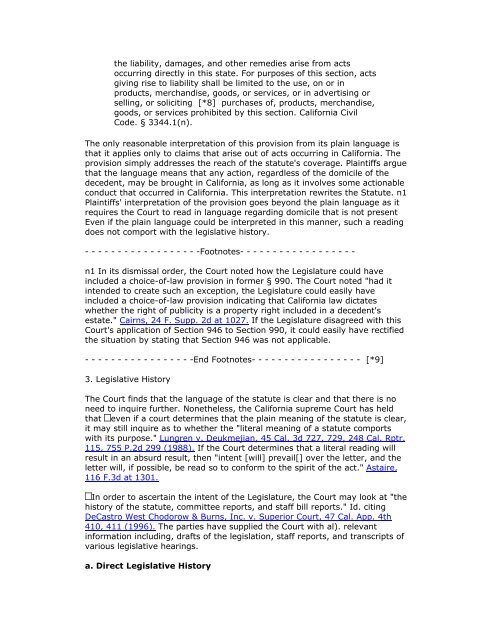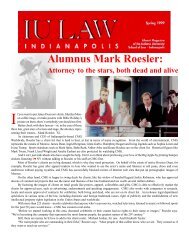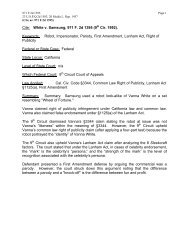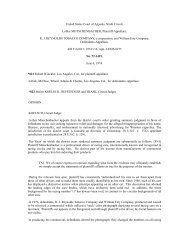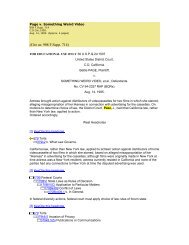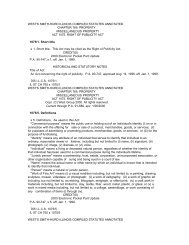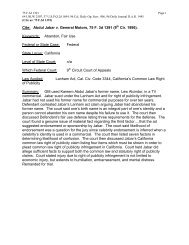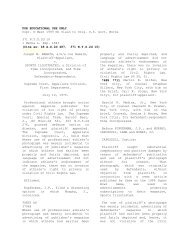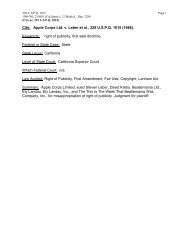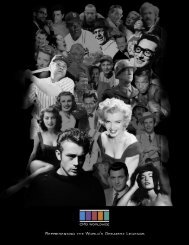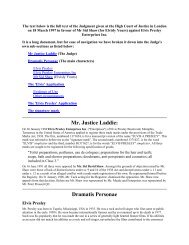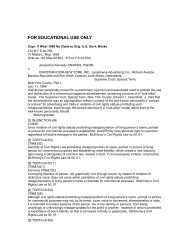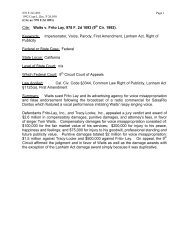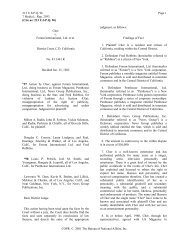Cairns v. Franklin Mint Company - Mark Roesler
Cairns v. Franklin Mint Company - Mark Roesler
Cairns v. Franklin Mint Company - Mark Roesler
Create successful ePaper yourself
Turn your PDF publications into a flip-book with our unique Google optimized e-Paper software.
the liability, damages, and other remedies arise from actsoccurring directly in this state. For purposes of this section, actsgiving rise to liability shall be limited to the use, on or inproducts, merchandise, goods, or services, or in advertising orselling, or soliciting [*8] purchases of, products, merchandise,goods, or services prohibited by this section. California CivilCode. § 3344.1(n).The only reasonable interpretation of this provision from its plain language isthat it applies only to claims that arise out of acts occurring in California. Theprovision simply addresses the reach of the statute's coverage. Plaintiffs arguethat the language means that any action, regardless of the domicile of thedecedent, may be brought in California, as long as it involves some actionableconduct that occurred in California. This interpretation rewrites the Statute. n1Plaintiffs' interpretation of the provision goes beyond the plain language as itrequires the Court to read in language regarding domicile that is not presentEven if the plain language could be interpreted in this manner, such a readingdoes not comport with the legislative history.- - - - - - - - - - - - - - - - - -Footnotes- - - - - - - - - - - - - - - - - -n1 In its dismissal order, the Court noted how the Legislature could haveincluded a choice-of-law provision in former § 990. The Court noted "had itintended to create such an exception, the Legislature could easily haveincluded a choice-of-law provision indicating that California law dictateswhether the right of publicity is a property right included in a decedent'sestate." <strong>Cairns</strong>, 24 F. Supp. 2d at 1027. If the Legislature disagreed with thisCourt's application of Section 946 to Section 990, it could easily have rectifiedthe situation by stating that Section 946 was not applicable.- - - - - - - - - - - - - - - - -End Footnotes- - - - - - - - - - - - - - - - - [*9]3. Legislative HistoryThe Court finds that the language of the statute is clear and that there is noneed to inquire further. Nonetheless, the California supreme Court has heldthat even if a court determines that the plain meaning of the statute is clear,it may still inquire as to whether the "literal meaning of a statute comportswith its purpose." Lungren v. Deukmejian, 45 Cal. 3d 727, 729, 248 Cal. Rptr.115, 755 P.2d 299 (1988). If the Court determines that a literal reading willresult in an absurd result, then "intent [will] prevail[] over the letter, and theletter will, if possible, be read so to conform to the spirit of the act." Astaire,116 F.3d at 1301.In order to ascertain the intent of the Legislature, the Court may look at "thehistory of the statute, committee reports, and staff bill reports." Id. citingDeCastro West Chodorow & Burns, Inc. v. Superior Court, 47 Cal. App. 4th410, 411 (1996). The parties have supplied the Court with al). relevantinformation including, drafts of the legislation, staff reports, and transcripts ofvarious legislative hearings.a. Direct Legislative History


